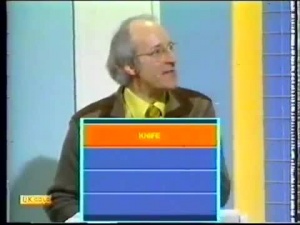Odd One Out
(→Pictures) |
(→Web links) |
||
| (18 intermediate revisions not shown) | |||
| Line 2: | Line 2: | ||
<div class="box"> | <div class="box"> | ||
| + | |||
== Host == | == Host == | ||
| Line 12: | Line 13: | ||
== Broadcast == | == Broadcast == | ||
| - | + | BBC1, 16 April 1982 to 19 April 1985 (46 episodes in 4 series) | |
</div> | </div> | ||
| Line 18: | Line 19: | ||
== Synopsis == | == Synopsis == | ||
| - | The first of the successful BBC trio of Daniels-hosted game shows. Basic idea was to nominate which of four listed items was the odd one out (for | + | The first of the successful BBC trio of Daniels-hosted game shows. Basic idea was to nominate which of four listed items was the odd one out (for 2 points) and why (for 3 more points). |
| - | + | <div class="image"><IMG src="/atoz/programmes/o/odd_one_out/ooo1.jpg" width="300" height="225">''The face of a contestant.''</div> | |
| - | + | <div class="image"><IMG src="/atoz/programmes/o/odd_one_out/ooo2.jpg" alt="ooo2.jpg" width="300" height="225">''New York City: BBC Style''</div> | |
| - | + | Thus, inevitable humour came from desperate contestants buzzing in after just the first word was read out. There was more laffs to be had because you could - if you wished - force your opponents to explain the reason for the odd one out if you wanted to - and if they failed to do so, you would gain extra points. | |
| - | There was also a 'returning champion' mechanism, which at first had no limit, but | + | <div class=image> |
| + | [[File:Odd one out single clue.jpg|300px]] | ||
| + | ''Go on: what links blank, blank, and blankety blank?'' | ||
| + | </div> | ||
| + | |||
| + | <div class="image"><IMG src="/atoz/programmes/o/odd_one_out/ooo3.jpg" alt="ooo3.jpg" width="300" height="225">''A trio of contestants''</div> | ||
| + | |||
| + | Two games were played, each with three players and winners of those two games each got a chance to win a prize in the Bonus Game. They'd be given up to three clues and had to spot the connection between them (not unlike [[Connections]], which, coincidentally, started just before 'Odd One Out' finished). The fewer clues they needed, the better the prize. They then went on to face each other in a show-down where the questions revolved around objects, pictures, music clues etc, as well as the words. | ||
| + | |||
| + | <div class="image"><IMG src="/atoz/programmes/o/odd_one_out/ooo4.jpg" alt="ooo4.jpg" width="300" height="225">''Presumably, all the others are famous Woodys''</div> | ||
| + | |||
| + | The end game was similar to the Bonus Game, except that the contestant was only allowed one clue. In quite a clever twist, he/she had to choose the top, middle or bottom line, and, when the clue was revealed, Daniels would state whether it was the easiest, medium or most difficult clue. Being lucky enough to find the easiest or medium clue usually won the contestant a decent prize (normally a holiday), but finding the hardest clue very rarely, if ever, resulted in success. (One example of a contestant finding the latter was when he was given the word 'trunks' and guessed, not unreasonably, at 'swimming'. The answer was, in fact, 'Elephants' - the other clues were 'Never forgets' - clearly the easiest - and 'Tusks', the second-easiest). | ||
| + | |||
| + | There was also a 'returning champion' mechanism, which at first had no limit, but in the penultimate (1984) series, a very bright young lady, Anna Crabtree, kept on winning every week for virtually the whole series and, of course, clocked up plenty of prizes. After this, for the final series only, the champions were restricted to a maximum of three shows. | ||
| + | |||
| + | A decent show, with a simple yet highly effective format and very well-hosted by Daniels, who consistently kept up a high level of professionalism and cheerful bonhomie with the contestants, just as he would also do in his two later quizzes, namely [[Every Second Counts]] (which started less than a year after [[Odd One Out]] finished) and [[Wipeout]]. | ||
| + | |||
| + | == Catchphrases == | ||
| + | |||
| + | "...Is not the right answer!" | ||
| + | |||
| + | (After meeting the contestants): "Hope you have a good night with us on 'Odd One Out' - oh, and we're going to play 'Odd One Out!" | ||
| + | |||
| + | "Now, do you want to challenge (whoever) or tell me what the others have in common yourself?" | ||
| + | |||
| + | "...And that wibbly-wobbly sound tells me that it's the end of the round!" | ||
| + | |||
| + | "We'll see you next week on 'Odd One Out' - bye for now!" | ||
== Inventor == | == Inventor == | ||
| Line 34: | Line 62: | ||
''"In your notes regarding Odd One Out, you mention that the format is similar to a U.S. format titled Knockout. That is because Odd One Out was the BBC version of Knockout. The Beeb licensed the format (via Action Time) from Ralph Edwards Productions. I know this because, I was working for REP when I devised and produced the U.S. format."'' | ''"In your notes regarding Odd One Out, you mention that the format is similar to a U.S. format titled Knockout. That is because Odd One Out was the BBC version of Knockout. The Beeb licensed the format (via Action Time) from Ralph Edwards Productions. I know this because, I was working for REP when I devised and produced the U.S. format."'' | ||
| - | == | + | == Music == |
| - | + | ||
| - | + | ||
| - | + | ||
| - | + | ||
| - | + | Ronnie Hazlehurst | |
| - | + | == Trivia == | |
| - | + | The link between ____, ____, and ____ is that they're all types of lightning - fork, sheet, and ball. Knife and Fork should lead contestants to think "cutlery". | |
| - | + | == Web links == | |
| - | + | [http://en.wikipedia.org/wiki/Odd_One_Out Wikipedia entry] | |
| - | + | Opening titles from [http://www.ravensbourne.ac.uk/bbc-motion-graphics-archive/odd-one-out-1982 1982] and [http://www.ravensbourne.ac.uk/bbc-motion-graphics-archive/odd-one-out-1984 1984] in the BBC Motion Graphics Archive | |
| - | + | == See also == | |
| - | '' | + | [[Weaver's Week 2016-03-27#Odd_One_Out|Weaver's Week review]] as part of a Paul Daniels appreciation. |
[[Category:General Knowledge Quiz]] | [[Category:General Knowledge Quiz]] | ||
Current revision as of 03:25, 8 July 2023
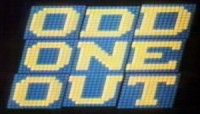
Contents |
Host
Co-hosts
John Junkin (voiceover)
Broadcast
BBC1, 16 April 1982 to 19 April 1985 (46 episodes in 4 series)
Synopsis
The first of the successful BBC trio of Daniels-hosted game shows. Basic idea was to nominate which of four listed items was the odd one out (for 2 points) and why (for 3 more points).
 The face of a contestant.
The face of a contestant.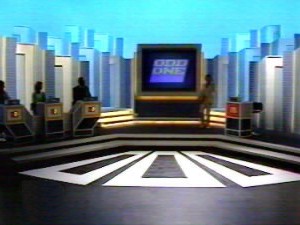 New York City: BBC Style
New York City: BBC StyleThus, inevitable humour came from desperate contestants buzzing in after just the first word was read out. There was more laffs to be had because you could - if you wished - force your opponents to explain the reason for the odd one out if you wanted to - and if they failed to do so, you would gain extra points.
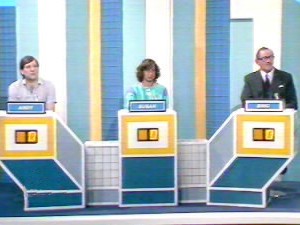 A trio of contestants
A trio of contestantsTwo games were played, each with three players and winners of those two games each got a chance to win a prize in the Bonus Game. They'd be given up to three clues and had to spot the connection between them (not unlike Connections, which, coincidentally, started just before 'Odd One Out' finished). The fewer clues they needed, the better the prize. They then went on to face each other in a show-down where the questions revolved around objects, pictures, music clues etc, as well as the words.
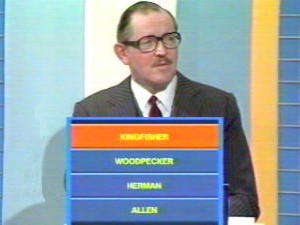 Presumably, all the others are famous Woodys
Presumably, all the others are famous WoodysThe end game was similar to the Bonus Game, except that the contestant was only allowed one clue. In quite a clever twist, he/she had to choose the top, middle or bottom line, and, when the clue was revealed, Daniels would state whether it was the easiest, medium or most difficult clue. Being lucky enough to find the easiest or medium clue usually won the contestant a decent prize (normally a holiday), but finding the hardest clue very rarely, if ever, resulted in success. (One example of a contestant finding the latter was when he was given the word 'trunks' and guessed, not unreasonably, at 'swimming'. The answer was, in fact, 'Elephants' - the other clues were 'Never forgets' - clearly the easiest - and 'Tusks', the second-easiest).
There was also a 'returning champion' mechanism, which at first had no limit, but in the penultimate (1984) series, a very bright young lady, Anna Crabtree, kept on winning every week for virtually the whole series and, of course, clocked up plenty of prizes. After this, for the final series only, the champions were restricted to a maximum of three shows.
A decent show, with a simple yet highly effective format and very well-hosted by Daniels, who consistently kept up a high level of professionalism and cheerful bonhomie with the contestants, just as he would also do in his two later quizzes, namely Every Second Counts (which started less than a year after Odd One Out finished) and Wipeout.
Catchphrases
"...Is not the right answer!"
(After meeting the contestants): "Hope you have a good night with us on 'Odd One Out' - oh, and we're going to play 'Odd One Out!"
"Now, do you want to challenge (whoever) or tell me what the others have in common yourself?"
"...And that wibbly-wobbly sound tells me that it's the end of the round!"
"We'll see you next week on 'Odd One Out' - bye for now!"
Inventor
Thanks to the creator, Mark Maxwell-Smith, for this email:
"In your notes regarding Odd One Out, you mention that the format is similar to a U.S. format titled Knockout. That is because Odd One Out was the BBC version of Knockout. The Beeb licensed the format (via Action Time) from Ralph Edwards Productions. I know this because, I was working for REP when I devised and produced the U.S. format."
Music
Ronnie Hazlehurst
Trivia
The link between ____, ____, and ____ is that they're all types of lightning - fork, sheet, and ball. Knife and Fork should lead contestants to think "cutlery".
Web links
Opening titles from 1982 and 1984 in the BBC Motion Graphics Archive
See also
Weaver's Week review as part of a Paul Daniels appreciation.

